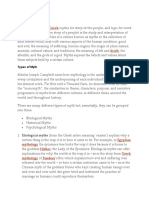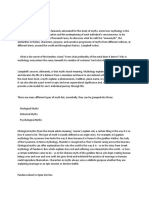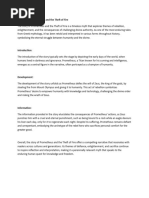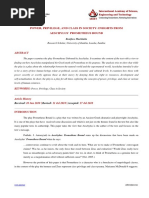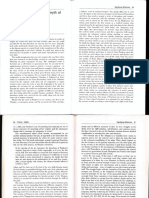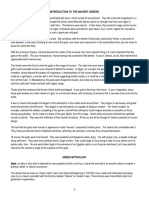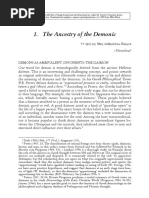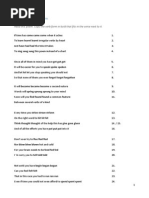Activity 6 Textual Analysis
Activity 6 Textual Analysis
Uploaded by
Veronica Salvador DumanopCopyright:
Available Formats
Activity 6 Textual Analysis
Activity 6 Textual Analysis
Uploaded by
Veronica Salvador DumanopCopyright
Available Formats
Share this document
Did you find this document useful?
Is this content inappropriate?
Copyright:
Available Formats
Activity 6 Textual Analysis
Activity 6 Textual Analysis
Uploaded by
Veronica Salvador DumanopCopyright:
Available Formats
Name: Dumanop, Veronica S.
Course and Year: BSED-2 ENGL
Textual Analysis of Prometheus and Io
For his courageous strength, Prometheus is most notable. Although the very Titan who
helped him come to power is harshly punished by Zeus, Prometheus never yields to the threats
of the god. Hamilton notes that his reputation remains intact, despite slight variations in the
Prometheus tale; he is a “rebel against injustice and the authority of power.”
In this way, the myths present an important aspect of the Greek conception of a hero:
the ability to suffer immense challenges. As we meet other heroes in later tales, other aspects of
a hero’s character will come out. With Prometheus, the story emphasizes his quiet resolve and
incredible strength. This humanizes the hero, making him humble and decent, as any reader of
the myth might want to be.
Mankind enjoys few or none of the external benefits enjoyed by animals, such as fur
coats or protective shells. Instead, humans have been given fire, representing human power
over energy. Human ingenuity is necessary to convert fire and energy to human purposes. Fire
is a heavenly gift, having come from the sun and from a god.
The reader discovers how earthly misery was born in the famous tale of Pandora's box.
It is interesting to note that like Eve in the Judeo-Christian tradition, women are blamed for all
human suffering. In connection with the Adam and Eve story, in which Eve is said to have
ruined the utopia where mankind once lived, scholars have pointed to this fact. Retribution, a
recurring theme in mythology, is quite notable in the story of Pandora. The Greek gods tend to
lash out harshly when they perceive wrong done to them, and the case of Pandora is no
exception. She was sent to earth so that her curiosity would drive her to open the box.
The Pandora story also underscores Zeus’s crafty nature. From Pandora’s box, mortals
and gods alike understand the power of the god and fear his authority—at the same time, by
leaving the fault in Pandora’s lap, he avoids direct responsibility for the evils in the world.
Interestingly, hope came out of the box, too. Does that mean that hope could be a
misfortune as well? Perhaps, if hope represents a clinging to that which is untrue and does not
exist. Or perhaps, if hope is not a misfortune, hope represents the kindness in Zeus’s heart, in
that he grants mankind the ability to aspire and improve despite the evils released from the box.
The myth of Prometheus and Io shows how the enduring spirit of Prometheus is
refigured in the suffering Io. By telling the prophecy to Io, Prometheus gives her hope that will
help her stay strong in the hard times ahead. The story that Io tells Prometheus reveals much
about the relationship between Zeus and Hera. In this sense, Io is a counter-example versus
many of the weak, naïve, or innocent female characters throughout mythology.
Textual Analysis of Europa
The story of Europa depicts Zeus in desperate desire of a mortal maiden. Hamilton
notes that it is unclear why Hera never opposes this relationship. The myth leaves this issue for
the reader to interpret.
This story also provides a good example of a human who trusts the gods. Although she
is frightened to ride on a bull across the ocean, Europa trusts Zeus when he says he loves her
and will not do her harm. Note that this is one of many myths in which a god appears to a
human in animal or human form. In such cases it is clear that the divine nature is not lost,
though the god picks up, for a time, some of the qualities of the animal.
Likewise, note that Zeus is distinguished here with a specific put on earth, the island of
Crete. The divine beings are not generally wherever consistently as in some strict customs; they
will in general be in some spot like human creatures are, despite the fact that they likewise can
act a ways off when important.
The theme of reciprocity arises throughout Greek mythology, and in Europa’s trusting
nature, it is evident. Only good things come to her when she trusts Zeus: she bears children and
lives a happy life on Crete. The question then arises whether it is better to give in to the gods
against one’s wishes or to suffer the consequences of fighting for what one wants. The question
is complicated because of the varying kinds of punishments that are meted out against the
unfaithful, sometimes very severe.
The tale of Odysseus and the Cyclops is one of the most classic stories of the Greek
tradition. It is told in Homer’s Odyssey, which details Odysseus’s various adventures while
journeying home from war. This story shows the heroism and craftiness of Odysseus. Although
Odysseus also is very strong, the story demonstrates the advantage of clever thinking in
addition to brute strength.
The story of Polyphemus also reveals important aspects of Greek heroism: leadership
and courage under pressure. None of Odysseus’s men has the sense to plot an escape from
the cave; only their leader creates the plan and engages in the main execution.
You might also like
- Battle Cry of Freedom by James McPhersonDocument2 pagesBattle Cry of Freedom by James McPhersonKenny Cohen50% (2)
- Othello ScriptDocument6 pagesOthello ScriptMichelle100% (1)
- Bernard Repertoire ListDocument5 pagesBernard Repertoire ListBrianna BernardNo ratings yet
- Questions About The Company of WolvesDocument3 pagesQuestions About The Company of WolvesAndré Soares de Freitas100% (1)
- Fo - Great BooksDocument3 pagesFo - Great BooksAjoy JaucianNo ratings yet
- Malasiqui Agno Valley College - PrometheusDocument3 pagesMalasiqui Agno Valley College - PrometheuschubbychubzNo ratings yet
- MYTHOLOGY IntroductionDocument9 pagesMYTHOLOGY IntroductionJENELYN GUCORNo ratings yet
- Prometheus The Friend of ManDocument4 pagesPrometheus The Friend of ManjonaemauelaguiarNo ratings yet
- Thesis Statement For PrometheusDocument6 pagesThesis Statement For Prometheusfbzgmpm3100% (2)
- Chapter 3Document8 pagesChapter 3mayannroque2001No ratings yet
- Types of MythDocument3 pagesTypes of MythRejelle CosteloNo ratings yet
- Lesson 7 PrometheusDocument3 pagesLesson 7 PrometheusChristineNo ratings yet
- 1.2. Prometheus and PandoraDocument22 pages1.2. Prometheus and Pandorafroilan.tinduganNo ratings yet
- Mitologia GriegaDocument19 pagesMitologia GriegaLeobardo NavarroNo ratings yet
- 7.3 Greek MythsDocument17 pages7.3 Greek MythsnosheenNo ratings yet
- Gods Goddesses and HerosDocument4 pagesGods Goddesses and Herosapi-291662375100% (3)
- Classical Mythology Common Literary Allusions Education Presentation Blue and Gold Illustrative StyleDocument16 pagesClassical Mythology Common Literary Allusions Education Presentation Blue and Gold Illustrative StylemarbelladripNo ratings yet
- Cams PaperDocument6 pagesCams Paperapi-317381238No ratings yet
- Lesson Classical Mythology Common Literary AllusionsDocument20 pagesLesson Classical Mythology Common Literary Allusionsc58s4v6qqqNo ratings yet
- Mythology and Folklore (Mini Module)Document20 pagesMythology and Folklore (Mini Module)George Kevin TomasNo ratings yet
- The Story of PR-WPS OfficeDocument1 pageThe Story of PR-WPS Officepadullonjustine1No ratings yet
- Greek Mythology: A Collection of the Best Greek MythsFrom EverandGreek Mythology: A Collection of the Best Greek MythsRating: 5 out of 5 stars5/5 (1)
- Thesis Statement For Greek GodsDocument4 pagesThesis Statement For Greek Godsnicholebrownbillings100% (2)
- English 8 Modul1Document55 pagesEnglish 8 Modul1Ilyn Relampago BacanNo ratings yet
- MythDocument1 pageMythJustin A VillanuevaNo ratings yet
- Prometheus Literature AnalysisDocument4 pagesPrometheus Literature Analysisgwynette realoNo ratings yet
- Literary Types in Oral Literature 2Document5 pagesLiterary Types in Oral Literature 2996fwq6tfsNo ratings yet
- Module Maam RadaDocument10 pagesModule Maam RadaIng Khay IINo ratings yet
- Ultimate Greek Mythology: Adventurous Stories, Fun Facts, Amazing History, and Beyond!From EverandUltimate Greek Mythology: Adventurous Stories, Fun Facts, Amazing History, and Beyond!No ratings yet
- Ijll - Power, Privelege and Class in Society Insights From Aeshylus' Prometheus BoundDocument8 pagesIjll - Power, Privelege and Class in Society Insights From Aeshylus' Prometheus Boundiaset123No ratings yet
- Zeitlin PandoraDocument9 pagesZeitlin PandoraMaría PetracchiNo ratings yet
- Homer PresentationDocument2 pagesHomer PresentationBriNo ratings yet
- Metamorphoses Tells of How This Came To Be, Through The Goddess' Triumph Over Her UncleDocument3 pagesMetamorphoses Tells of How This Came To Be, Through The Goddess' Triumph Over Her UncleKong Sun LimNo ratings yet
- Greek Mythology Class Notes For Mythology PacketDocument3 pagesGreek Mythology Class Notes For Mythology Packetapi-263744910No ratings yet
- Masinadiong AssignmentNo1Document2 pagesMasinadiong AssignmentNo1Danny MasinadiongNo ratings yet
- Mythology: Gods and GoddessesDocument5 pagesMythology: Gods and GoddessesAntonette RamosNo ratings yet
- The Myth of PrometheusDocument2 pagesThe Myth of PrometheusAnonymous WJxKIoh5No ratings yet
- Oedipus The King (Sophocles)Document8 pagesOedipus The King (Sophocles)sonashekhawat006No ratings yet
- Mythology and FolkloreDocument7 pagesMythology and FolkloreTrixia MadrigalNo ratings yet
- How The World Was MadeDocument5 pagesHow The World Was MaderebekkyahNo ratings yet
- GreekgodsandgoddesDocument7 pagesGreekgodsandgoddeskubranurkara1230No ratings yet
- Tragedy Aeschylus Play Prometheus Zeus Oceanus Io Hermes: Prometheus Bound, Greek Promētheus DesmōtēsDocument2 pagesTragedy Aeschylus Play Prometheus Zeus Oceanus Io Hermes: Prometheus Bound, Greek Promētheus DesmōtēsRuth MoToNo ratings yet
- Chapter 01 PDFDocument30 pagesChapter 01 PDFtelemagicoNo ratings yet
- Greek MythologyDocument2 pagesGreek MythologyDaphnie Anne DavidNo ratings yet
- Greece Vs Egypt para HumansDocument6 pagesGreece Vs Egypt para Humansjetienne1991No ratings yet
- Argumentative Essay_ Greek MythologyDocument4 pagesArgumentative Essay_ Greek MythologyjessicacabreraNo ratings yet
- Victor Frankenstein Mary Shelley and Prometheus in the Role of CDocument11 pagesVictor Frankenstein Mary Shelley and Prometheus in the Role of Cranda.amureNo ratings yet
- Module in Eng 11Document9 pagesModule in Eng 11Gretchen Tajaran100% (1)
- Prometheus MythsDocument3 pagesPrometheus MythsDário Da SilvaNo ratings yet
- JOOOODocument2 pagesJOOOOSynapticCleft14No ratings yet
- Mythology PDFDocument6 pagesMythology PDFmonkeyluffy1059No ratings yet
- Greece and RomeDocument19 pagesGreece and Romeapi-287545371No ratings yet
- Greek Gods Thesis StatementDocument8 pagesGreek Gods Thesis Statementiapesmiig100% (2)
- Mythology-Children and Adolescent LiteratureDocument31 pagesMythology-Children and Adolescent LiteratureAlfred LontocNo ratings yet
- GreekCreationHistory CultureDocument6 pagesGreekCreationHistory CultureLipu RjNo ratings yet
- Greel 5Document1 pageGreel 5samu hayesNo ratings yet
- God and Goddesses of Greek Mythology SummaryDocument3 pagesGod and Goddesses of Greek Mythology SummaryBillNo ratings yet
- MINI LECTURE NOTES Lecturue For Finding Allusions Difference Athinian Vs Herculian Hero Importance of The IlliadDocument6 pagesMINI LECTURE NOTES Lecturue For Finding Allusions Difference Athinian Vs Herculian Hero Importance of The Illiadalbita--ricoNo ratings yet
- A Comparison Between Hindu and Greek MythologyDocument2 pagesA Comparison Between Hindu and Greek MythologyAgni DasNo ratings yet
- I. The Earliest HeroesDocument7 pagesI. The Earliest HeroesMáhádí HãssãñNo ratings yet
- Famous Demigods and Their Parents- Children's Greek & Roman MythsFrom EverandFamous Demigods and Their Parents- Children's Greek & Roman MythsNo ratings yet
- Tổng Hợp Văn Học AnhDocument196 pagesTổng Hợp Văn Học AnhNguyễn Hoàng Nhật KhangNo ratings yet
- 100 Carti de CititDocument7 pages100 Carti de Cititstatistique2No ratings yet
- Teleprompter PurposiveDocument3 pagesTeleprompter PurposiveJulius CabinganNo ratings yet
- Jane Austen and William Shakespeare: A Love Affair in Literature, Film and Performance Marina Cano 2024 Scribd DownloadDocument53 pagesJane Austen and William Shakespeare: A Love Affair in Literature, Film and Performance Marina Cano 2024 Scribd Downloadncsaragosek100% (3)
- Romeo and Juliet Survival Guide Summaries Reading Questions PacketDocument6 pagesRomeo and Juliet Survival Guide Summaries Reading Questions PacketjsalamataNo ratings yet
- Frankenstein QuotesDocument1 pageFrankenstein Quotesm.longNo ratings yet
- Elizabethan Tragedy: A Thematic and Structural StudyDocument24 pagesElizabethan Tragedy: A Thematic and Structural Studyyomdo eteNo ratings yet
- Download Full Romance Fiction and American Culture Love as the Practice of Freedom 1st Edition William A Gleason Editor Eric Murphy Selinger Editor PDF All ChaptersDocument40 pagesDownload Full Romance Fiction and American Culture Love as the Practice of Freedom 1st Edition William A Gleason Editor Eric Murphy Selinger Editor PDF All Chaptersglantlabnok9100% (3)
- Groteska - LiteraturaDocument3 pagesGroteska - LiteraturaGregor GnjaaaahNo ratings yet
- Epic TheatreDocument5 pagesEpic Theatremjones4171100% (2)
- Reviewer in EnglishDocument5 pagesReviewer in Englishclaireagusan1029No ratings yet
- Response Paper - Against History, Against StateDocument2 pagesResponse Paper - Against History, Against StateMaida TahirNo ratings yet
- Dark - Sun ManualDocument49 pagesDark - Sun ManualJan PospíšilNo ratings yet
- Irregular Verbs Poem PDFDocument4 pagesIrregular Verbs Poem PDFEmanuel Diaz MartelNo ratings yet
- The Art of Telling Stories: Joseph U. NatanauanDocument94 pagesThe Art of Telling Stories: Joseph U. NatanauanGee RomanoNo ratings yet
- Critique Paper-HAMLET by William ShakepeareDocument5 pagesCritique Paper-HAMLET by William ShakepeareChar LayiNo ratings yet
- Irony in The Cask of AmontilladoDocument4 pagesIrony in The Cask of AmontilladoMahnoor AsifNo ratings yet
- 4th Lecture (Noun Phrases II) PDFDocument12 pages4th Lecture (Noun Phrases II) PDFGeoffrey YeungNo ratings yet
- BTVN - Conjunction (Bai Tap Cho HV)Document5 pagesBTVN - Conjunction (Bai Tap Cho HV)Fit TastyNo ratings yet
- Jhumpa LahiriDocument17 pagesJhumpa LahiriJavier SuarezNo ratings yet
- Books For Kindergarten: Reader)Document2 pagesBooks For Kindergarten: Reader)Anonymous K9cINmN100% (1)
- Subject/topic Grade/class Time/period Lesson DateDocument4 pagesSubject/topic Grade/class Time/period Lesson Dateapi-340574022No ratings yet
- Rip ScriptDocument4 pagesRip Scriptapi-249011710No ratings yet
- ISFNR Papers Published in FabulaDocument11 pagesISFNR Papers Published in FabulaCristian EnacheNo ratings yet
- Immediate download The Routledge Companion to American Literary Journalism 1st Edition William E. Dow ebooks 2024Document55 pagesImmediate download The Routledge Companion to American Literary Journalism 1st Edition William E. Dow ebooks 2024casisagaat100% (2)
- Dictionary of American Children's Fiction 1990-1994 (1996)Document485 pagesDictionary of American Children's Fiction 1990-1994 (1996)László SágiNo ratings yet






